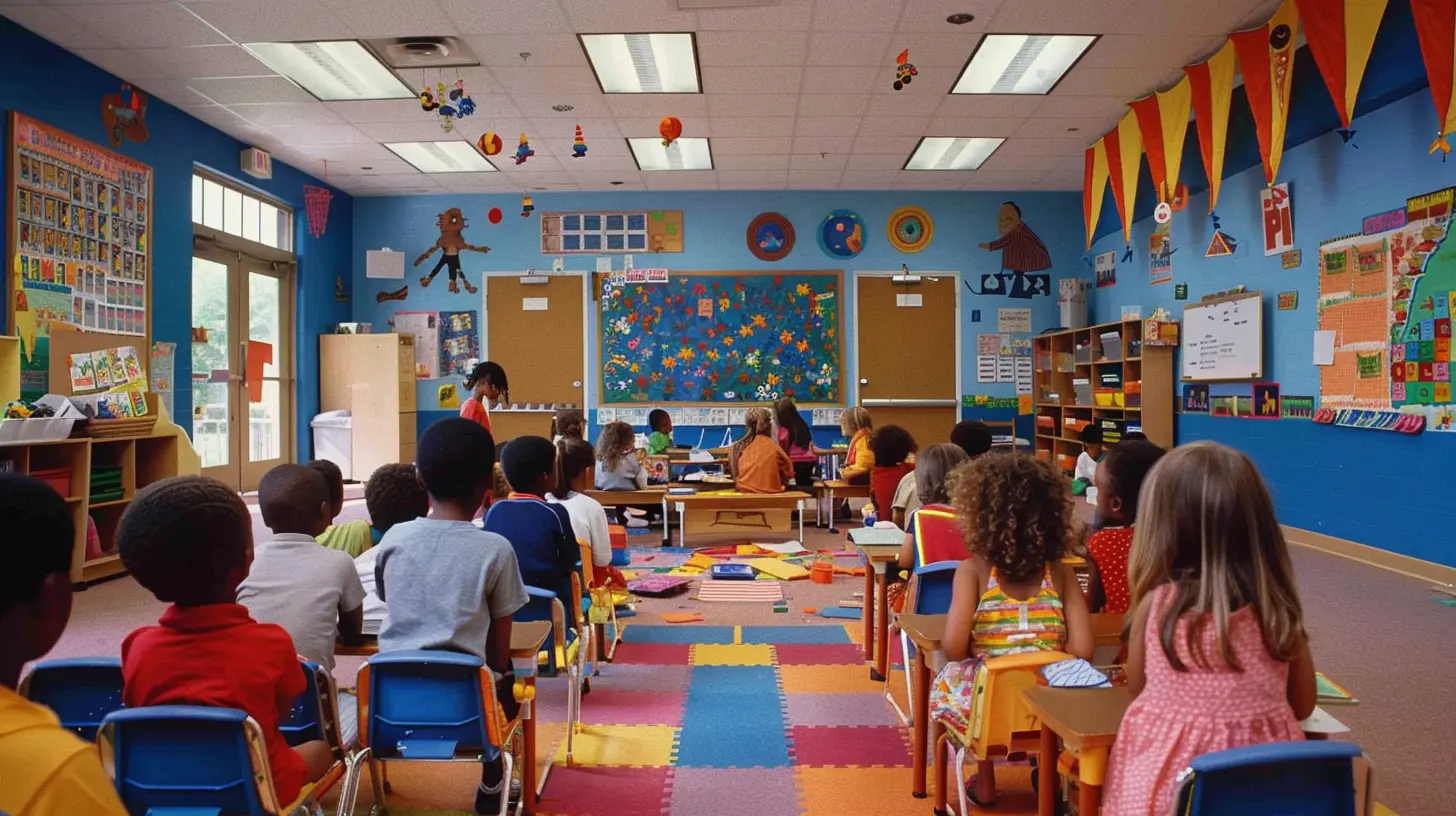The Role of Positive Reinforcement in Study Habits
28 December 2024
When was the last time you really enjoyed studying? For many students, studying feels more like an obligation than an enjoyable activity. But what if I told you that there's a way to make studying more rewarding, less stressful, and even something you kind of look forward to? Yep, it’s possible, and it all comes down to a little something called positive reinforcement.
In this article, we’re going to dive deep into the role of positive reinforcement in study habits, how it works, and how you can use it to become a better, more motivated learner. Ready to find out how to make studying less of a chore and more of a win-win situation? Let’s get started!

What is Positive Reinforcement?
Before we talk about how positive reinforcement can help you build better study habits, let’s break down what it actually is. In simple terms, positive reinforcement is a way of encouraging certain behaviors by rewarding them. It’s like giving yourself a high five after you’ve done something great. The idea is that by associating a positive outcome with a particular action, you’ll want to repeat that action more often.Think of it like training a dog. When your pup sits on command, you give it a treat, and that encourages the dog to sit next time, right? Positive reinforcement works the same way for us humans, except instead of dog treats, we reward ourselves with things like praise, breaks, or small rewards.
Now, imagine applying that same principle to your study habits. Every time you complete a study session or finish a difficult chapter, you reward yourself in some way. Over time, you start to associate studying with positive feelings, making it easier to stay on track and motivated.

The Psychology Behind Positive Reinforcement
Positive reinforcement is rooted in behavioral psychology, specifically in a concept known as operant conditioning. This theory, developed by psychologist B.F. Skinner, suggests that behaviors can be shaped through rewards and punishments. When a behavior is rewarded, it’s more likely to be repeated in the future.In the context of studying, positive reinforcement could be anything from allowing yourself a snack after an hour of focused study, to indulging in an episode of your favorite TV show after completing an assignment. The key here is consistency—rewarding yourself every time you engage in productive study behavior strengthens the likelihood that you’ll keep doing it.
But here’s the catch: Positive reinforcement works best when the reward is directly tied to the behavior. If you reward yourself for studying only sometimes or for unrelated things, the effect weakens. It’s like trying to train a dog to sit by giving it treats when it rolls over. Confusing, right? So, to make this work, you need to be intentional and consistent about how you apply positive reinforcement to your study habits.

Why Positive Reinforcement Beats Punishment
It’s natural to want to beat yourself up when you procrastinate or fail to meet a study goal. But focusing on punishment (e.g., telling yourself you can’t have fun this weekend because you didn’t study enough) is not as effective as positive reinforcement. Why?Well, punishment teaches you what not to do, but it doesn’t give you clear guidance on what you should do. It also tends to decrease motivation because it’s rooted in negative emotions like guilt or frustration. On the other hand, positive reinforcement builds motivation because it creates a positive association with the task at hand.
When you reward yourself for studying, your brain starts to link studying with pleasant outcomes, making you want to study more often. It’s a simple but powerful psychological trick!

How Positive Reinforcement Improves Study Habits
So, how exactly does positive reinforcement work its magic on your study habits? Let’s break it down into a few key ways:1. Creates a Positive Feedback Loop
One of the biggest benefits of positive reinforcement is that it sets up a positive feedback loop. You study, you reward yourself, and you feel good about it. This makes you want to study again, which leads to more rewards, and the cycle continues. Over time, this loop helps you form strong, consistent study habits.2. Boosts Motivation
Let’s face it: Studying can feel like a never-ending mountain to climb. But when you know there’s a reward waiting for you at the end of a study session, it’s easier to push through the tough parts. Whether it’s a small treat, a break, or even just the satisfaction of checking something off your to-do list, having something to look forward to can give you that extra boost of motivation.3. Reduces Procrastination
Procrastination is the enemy of good study habits. It’s easy to put off studying when the only reward is the distant, abstract idea of “doing well on the exam.” Positive reinforcement gives you more immediate rewards, which can help combat procrastination. When you know you’ll get a reward after a short study session, it’s harder to justify delaying.4. Improves Focus and Productivity
When you’re focused on earning your reward, you’re less likely to get distracted by other things. Positive reinforcement helps you stay on task because you know the faster you complete your work, the sooner you’ll get your reward. This can lead to more productive, efficient study sessions.5. Enhances Long-Term Retention
Study habits built on positive reinforcement tend to stick around longer than those driven by punishment or guilt. Why? Because positive emotions help solidify memories and learning. When you feel good about studying, you’re more likely to remember what you’ve learned and retain that information over the long term.Practical Ways to Use Positive Reinforcement in Your Study Routine
Now that we’ve covered why positive reinforcement is so effective, let’s get into the nitty-gritty of how you can incorporate it into your own study routine.1. Set Clear, Achievable Goals
Before you can reward yourself, you need to know what you’re working toward. Break your study sessions into clear, manageable goals. For example, instead of saying, "I’m going to study biology today," set a goal like, "I’m going to review chapters 3 and 4 for 45 minutes." The more specific your goal, the easier it is to reward yourself when you achieve it.2. Choose Meaningful Rewards
The reward you choose should be something that genuinely motivates you. It doesn’t have to be big or expensive, but it should be something you’ll look forward to. Maybe it’s a 10-minute break to scroll through social media, a snack, or an episode of your favorite TV show.Just be careful not to choose rewards that could derail your focus. For example, if your reward is watching TV, make sure it's just one episode and not a whole binge-watching session!
3. Use a Timer
Timers can be incredibly helpful when it comes to applying positive reinforcement. Set a timer for a specific study period (e.g., 30 or 45 minutes), and when the timer goes off, reward yourself for staying focused. This creates a pattern of short bursts of productivity followed by a reward, which can help make studying feel more manageable.4. Track Your Progress
Consider keeping a journal or checklist where you track your study sessions and rewards. Seeing your progress in black and white can be incredibly motivating. Plus, it helps you stay consistent with your positive reinforcement strategy.5. Avoid Over-Rewarding
While rewards are great, it’s important not to overdo it. If you give yourself too many rewards or set the bar too low, the rewards will lose their impact. The goal is to find a balance where the reward feels earned but not impossible to achieve.
Common Mistakes to Avoid
Even though positive reinforcement is a powerful tool, it’s easy to fall into some common traps that can undermine its effectiveness. Here are a few mistakes to watch out for:1. Inconsistent Rewards
If you reward yourself inconsistently or for the wrong things, you’ll confuse your brain. Make sure the reward is closely linked to your study behavior, and apply it consistently.2. Setting Unrealistic Goals
If your goals are too big or vague, you’ll set yourself up for failure. Make sure your study goals are achievable so that you can actually earn your reward.3. Over-Reliance on Rewards
While rewards are great for building study habits, you don’t want to become completely dependent on them. Over time, try to reduce the frequency of your rewards so that studying becomes its own reward.Positive Reinforcement for Different Learning Styles
One last thing to keep in mind is that everyone learns differently, and the type of positive reinforcement that works best for you might depend on your learning style. For example:- Visual learners might benefit from creating a colorful progress chart where they can see their study achievements build up over time.
- Auditory learners could reward themselves with music breaks or listen to podcasts they enjoy.
- Kinesthetic learners might benefit from physical rewards, like going for a walk after a study session.
The key is to tailor your positive reinforcement strategy to your unique preferences and needs.
Conclusion
Positive reinforcement is like a secret weapon when it comes to building better study habits. By rewarding yourself for productive behavior, you create a positive feedback loop that boosts motivation, reduces procrastination, and improves focus. Whether it's a small treat or a short break, incorporating rewards into your study routine can make the process more enjoyable and help you stick to your goals in the long run.So the next time you sit down to study, think about how you can use positive reinforcement to make it a little less of a chore and a lot more rewarding. Your future self will thank you!
all images in this post were generated using AI tools
Category:
Study TipsAuthor:

Olivia Lewis
Discussion
rate this article
18 comments
Rhea Hall
Positive reinforcement in study habits? Absolutely! If rewards don’t motivate you, then what’s the point? Let’s get those grades up!
March 21, 2025 at 12:01 PM

Olivia Lewis
Thank you for your enthusiasm! Positive reinforcement can indeed be a powerful motivator in improving study habits and boosting grades.
Lexi Heath
This article beautifully highlights the power of positive reinforcement. It’s inspiring and a gentle reminder of how encouragement truly transforms learning!
February 22, 2025 at 1:51 PM

Olivia Lewis
Thank you for your kind words! I'm glad you found the article inspiring and valuable in highlighting the impact of positive reinforcement on learning.
Shania Wolf
Absolutely loved this article! Positive reinforcement is such a game changer for developing effective study habits. It’s amazing how encouragement can transform learning experiences, making them more enjoyable and productive. Keep spreading the positivity!
February 14, 2025 at 8:31 PM

Olivia Lewis
Thank you so much for your kind words! I'm glad you found the article helpful. Positive reinforcement truly makes a significant difference in learning!
Talis Phelps
Positive reinforcement in studying: because nothing motivates like the thought of a snack break for every chapter read! Who knew learning could be so deliciously rewarding?
February 3, 2025 at 7:45 PM

Olivia Lewis
Absolutely! Positive reinforcement, like snack breaks, can make studying enjoyable and boost motivation. It's a great way to create a rewarding learning environment!
Zeno McFarland
Great insights! Positive reinforcement truly transforms study habits and boosts motivation effectively!
January 27, 2025 at 8:13 PM

Olivia Lewis
Thank you! I’m glad you found the insights valuable. Positive reinforcement really does make a significant difference in learning!
Shania Benton
In learning’s dance, sweet praise ignites, A spark of joy that fuels our nights. Positive whispers guide the way, Turning toil to bright ballet.
January 23, 2025 at 12:29 PM

Olivia Lewis
Thank you for your poetic reflection! It beautifully captures the essence of how positive reinforcement can transform learning into an enjoyable journey.
Zaylee McCarthy
Positive reinforcement in study habits? Finally, a guilt-free excuse to reward myself with snacks! If only my textbooks could hand out gold stars instead of just headaches!
January 15, 2025 at 7:56 PM

Olivia Lewis
Absolutely! Snacks can be a great reward for your hard work. Just like gold stars, positive reinforcement makes studying more enjoyable!
Lark Nguyen
Positive reinforcement fosters motivation and enhances study habits, leading to improved learning outcomes and academic success.
January 8, 2025 at 9:07 PM

Olivia Lewis
Thank you for your insightful comment! I completely agree that positive reinforcement plays a crucial role in motivating students and enhancing their study habits.
Milena Fisher
Great insights! I'm intrigued by how positive reinforcement can transform study habits. Excited to explore practical applications for better learning outcomes!
January 4, 2025 at 4:45 AM

Olivia Lewis
Thank you! I'm glad you found the insights valuable. Positive reinforcement can indeed make a significant difference in study habits, and I'm excited to hear about your explorations in this area!
Leo McMurtry
Absolutely loved this article! Positive reinforcement truly transforms study habits, making learning enjoyable and motivating. Keep spreading that positivity in education! 🌟📚✨
January 2, 2025 at 9:10 PM

Olivia Lewis
Thank you so much for your kind words! I'm thrilled you enjoyed the article and see the value of positive reinforcement in learning. Let's keep inspiring each other! 🌟📚
Soleil McKenzie
Positive reinforcement cultivates motivation, fostering persistence and enhancing effective study habits over time.
January 2, 2025 at 4:29 AM

Olivia Lewis
Thank you for your insightful comment! I completely agree—positive reinforcement is key to nurturing motivation and building lasting study habits.
Leona Sheppard
Great insights! Positive reinforcement truly enhances motivation. Incorporating small rewards can significantly improve study habits and overall academic success.
January 1, 2025 at 9:39 PM

Olivia Lewis
Thank you for your feedback! I completely agree—small rewards can make a big difference in motivation and academic success.
Mercy McElveen
This article effectively highlights the importance of positive reinforcement in cultivating productive study habits. Great insights for educators and students alike!
January 1, 2025 at 12:37 PM

Olivia Lewis
Thank you for your thoughtful comment! I'm glad you found the insights valuable for both educators and students.
Monique Monroe
This article beautifully highlights the impact of positive reinforcement on study habits. Implementing such strategies not only motivates students but also fosters a more enjoyable learning environment. Thank you for sharing!
December 31, 2024 at 10:05 PM

Olivia Lewis
Thank you for your kind words! I'm glad you found the article insightful and that it resonated with the importance of positive reinforcement in learning.
Romina McKee
What a fantastic read! Emphasizing positive reinforcement in study habits can truly transform learning experiences. Thank you for sharing these valuable insights that encourage students to thrive and grow!
December 30, 2024 at 5:46 AM

Olivia Lewis
Thank you for your kind words! I'm glad you found the insights valuable—positive reinforcement can indeed make a significant difference in learning.
Zayden Morrow
Great insights! Positive reinforcement truly makes a difference.
December 29, 2024 at 8:51 PM

Olivia Lewis
Thank you! I'm glad you found the insights valuable. Positive reinforcement really can transform study habits.
Quincy Clark
This article beautifully highlights the importance of positive reinforcement in cultivating effective study habits. By fostering a supportive learning environment, we not only enhance motivation but also empower students to take ownership of their educational journeys. Thank you for sharing these valuable insights!
December 29, 2024 at 5:38 AM

Olivia Lewis
Thank you for your thoughtful comment! I'm glad you found the insights on positive reinforcement valuable in enhancing study habits.
Zia Rosales
Embrace the power of positive reinforcement! Celebrate small victories in your study journey, as each step forward builds confidence and fuels your passion for learning. Keep shining!
December 28, 2024 at 1:04 PM

Olivia Lewis
Thank you for your insightful comment! Celebrating small victories is indeed crucial for building confidence and enhancing the learning experience. Keep embracing positivity!
MORE POSTS

Why Lifelong Learners Thrive in a Changing Job Market

Why Early Exposure to STEM is Important for Kids

The Power of Reflection: Encouraging Students to Take Ownership of Their Learning

How to Foster Critical Thinking in STEM Classrooms

The Power of Reflection: Encouraging Students to Set Fitness Goals

Encouraging Innovation in the Classroom Through STEM Challenges

The Science Behind Learning Styles: What Educators Should Know

Learning Styles and Student Collaboration: Making It Work

How Virtual Reality Is Transforming STEM Learning

Learning Objectives and Lifelong Learning: Building Skills for the Future

How to Foster Creativity in Kinesthetic Learners